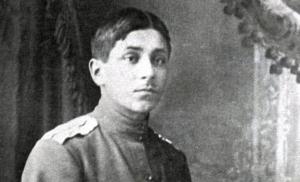Behavioral qualities of the individual. Methods for identifying personal qualities
(R. Cattell, modification by A.G. Gretsov)
Instructions: you have 42 questions and three answer options for each of them: “A”, “B” or “C”. When answering each question, choose one of these options - the one that most closely matches your ideas about yourself. Try to resort to the intermediate, vague option “B” as little as possible. Remember that there are no right or wrong answers here - all people are different, and everyone can express an individual opinion. Answer sincerely and accurately, without spending a lot of time thinking: give the answer that first comes to mind.
Questionnaire text
|
Questions |
Answer options |
|||
|
A |
B |
IN |
||
|
I could easily live alone, far from people | ||||
|
When I go to bed I |
I fall asleep quickly |
something in between |
I have difficulty falling asleep |
|
|
If I were driving a car on a road where there are many other cars, then I would prefer |
let whoever wants to overtake me |
would overtake all the cars ahead |
||
|
While in company, I give others the opportunity to joke and tell stories |
no, I'd rather tell you myself |
|||
|
Most people with whom I'm chatting, sure, glad to see me | ||||
|
I often notice that people do, it’s not at all like what they say later | ||||
|
If someone is rude to me, I can quickly forget about it |
when how | |||
|
I'd rather reveal my innermost thoughts |
my good friends | |||
|
When necessary, I always have enough energy |
hard to say | |||
|
There's more of me annoying people |
rude jokes make others blush |
I find it difficult to answer |
are late for an arranged meeting with me |
|
|
I really like inviting friends and entertaining them | ||||
|
I often have to overcome embarrassment |
Maybe | |||
|
If an acquaintance deceives me in small things, then I would rather pretend that I did not notice this, rather than “expose” him | ||||
|
I often worry about my past actions |
from time to time | |||
|
I think that I would be more interested in work related to |
technical devices |
hard to say | ||
|
If something distracts my attention from what I'm doing, this situation |
irritates me |
when how |
doesn't bother me |
|
|
If I get very rich, I will make sure that |
don't make yourself jealous |
live without embarrassment |
||
|
Worst punishment for me |
hard work |
to be locked in loneliness |
||
|
I was told that as a child |
calm, liked to be alone |
lively and active, sociable |
||
|
I think most witnesses tell the truth, even if it is not easy for them |
hard to say | |||
|
I never feel so unhappy that I want to cry | ||||
|
I'd rather work |
where I would have to be around people all the time |
I find it difficult to answer |
where I will work alone, in a quiet room |
|
|
What I do doesn't work for me | ||||
|
In most cases I |
I prefer to take a risk |
I prefer to act for sure |
||
|
Some people probably think I talk too much |
rather, it's like that |
I think not |
||
|
I make decisions |
faster than most people |
when how |
slower than most people |
|
|
I believe that I am a collaborative person. |
something in between | |||
|
If a person does not answer me immediately after I have said something to him, then I feel that I must have said something stupid. | ||||
|
I'm happy to do a person a favor by agreeing to schedule a meeting with them at a time that's convenient for them, even if it's a little inconvenient. |
depending on what kind of person he is | |||
|
Sometimes I have short periods of nausea or dizziness for no particular reason |
very rarely | |||
|
I would rather refuse my request than cause unnecessary inconvenience to the person I want to address it to. | ||||
|
More than many people, I live for today. |
hard to say | |||
|
I speak my mind no matter how many people may hear it | ||||
|
Sometimes I really want to get involved in other people's affairs, which don't really concern me | ||||
|
If I see that my old friend is cold towards me and avoids me, I usually think: |
"He has a bad mood" |
“Well, anything can happen...” |
“I wonder what I |
|
|
There are times when I don't want to talk to anyone all morning. | ||||
|
I get bored |
from time to time | |||
|
I like to do things my way in an original way |
when how | |||
|
I am cautious about making friends with new people | ||||
|
I suspect that people I consider to be my friends may not actually be friends at all. |
yes, in most cases | |||
|
I have unreasonable fears (of non-dangerous animals, certain places, etc.) | ||||
Processing the results
The results are calculated separately for seven scales. Each answer “B” is scored 1 point on the scale to which the corresponding question number belongs. Options “A” or “B” are scored 2 points if they match the “Key” below, or 0 points if they do not match.
Key to the technique
Scale 1: 1–B, 8–A, 15–B, 22–A, 29–A, 36–B
Scale 2: 2–A, 9–A, 16–B, 23–A, 30–B, 37–B
Scale 3: 3–B, 10–B, 17–A, 24–A, 31–B, 38–A
Scale 4: 4–B, 11–A, 18–B, 25–A, 32–A, 39–B
Scale 5: 5–A, 12–B, 19–B, 26–A, 33–A, 40–B
Scale 6: 6–A, 13–B, 20–B, 27–B, 34–A, 41–A
Scale 7: 7–B, 14–A, 21–B, 28–A, 35–B, 42–A
Interpretation of results
Indicators on each scale can be from 0 to 12. Indicators from 0 to 4 are low, 5-8 – average, 9-12 – high. Now let’s discuss what these scales are, what personality traits they talk about and how they are related to professions.
Scale 1: “Isolation–sociability". With low scores, a person is characterized by unsociability, isolation, and sometimes overly strict in his assessment of others. He likes to be alone and is not inclined to be frank even with friends. The work of such a person is more productive in solitude; professions in which technology or sign systems are the subject of work are more suitable for him. With high scores, a person is sociable, open and good-natured. He is characterized by kindness and ease of behavior. He willingly interacts with people, is active in eliminating conflicts, is not afraid of criticism, and readily responds to any events. Such a person successfully realizes himself in professions that involve intense interpersonal contacts (and these are almost all professions in which the subject of work is other people) and team work.
Scale 2: “Emotional instability–sustainability." With low scores, a person is susceptible to feelings, reacts violently to obstacles that arise on the way to achieving goals, and his mood is changeable. With high performance, the person is self-possessed and realistic. He is able to better follow the requirements of the group, is characterized by constancy of interests, but sometimes he may show insufficient flexibility and some insensitivity to the experiences of others. Emotional stability is an important quality in all those professions where work takes place under conditions of increased emotional tension; unexpected turns of events may arise, to which it is necessary to respond adequately.
Scale 3: “Tendency to Submit”–to dominance." With low grades, a person tends to give in to others, take the blame upon himself, and worry about his possible mistakes. He is characterized by tact, respectfulness, and sometimes shyness. Such people work productively in situations of external management, but the need to show their own initiative and the lack of leadership can confuse them. With high scores, a person is powerful, independent, self-confident, assertive, stubborn, and sometimes inclined to be aggressive. Independent in judgment and behavior, does not recognize pressure from outside, willful. Such a person actively defends personal goals, but it is quite difficult for him to adapt to strict demands from his superiors and colleagues. Therefore, such people often find themselves in work where they are “their own boss”: for example, they become individual entrepreneurs.
Scale 4: "Restraint"–expressiveness." At low levels, a person is characterized by prudence, caution, and prudence. He can be concerned about the future and tends not to show strong emotions, which is why others may seem somewhat boring and lethargic. With high scores, a person is cheerful, impulsive, careless, cheerful, and active. He is emotional, believes in luck, and often becomes a leader in companies and an enthusiast of joint activities. Restraint is a professionally important quality where an employee must always be polite, calm, and impartial (for example, a secretary-assistant or a diplomat). Expressiveness, on the contrary, is important for representatives of most creative professions.
Scale 5: Shyness–courage". With low scores, a person is timid, reserved, cautious, not entirely confident in his abilities, and is characterized by increased sensitivity to threats. With high scores, he is bold, active, risk-taking, and ready to deal with unfamiliar circumstances and people. Such a person can choose professions that require that the activity be carried out in conditions of increased risk (military, policeman, firefighter, etc.). By the way, sometimes fear also serves as a direct contraindication to certain professions: for example, some people are expelled from flight schools because they cannot jump with a parachute due to fear.
Scale 6: “Gullibility–suspicion". With low scores, a person is characterized by frankness, trustfulness, and benevolence towards others. Usually he gets along well with people and works well in a team, he is not envious, but others can abuse his gullibility. Those who receive high marks are characterized by increased suspicion, are wary of others, and are inclined to see a catch in their actions. His interests are usually turned towards himself, he is careful in his actions and words. Such an employee is more of an individualist by nature. He is often close to work related to the control of someone or something (traffic police inspector, quality manager in a retail chain, auditor, employee of the technical control department in production, etc.).
Scale 7: “Self-confidence–anxiety". With low scores, a person is self-confident, serene, cool-headed, and calm. This allows you to work effectively and confidently in situations involving increased responsibility, in a stressful environment (surgeon, broker, senior manager - top manager). With high scores, a person tends to worry about a variety of reasons, he is impressionable and vulnerable, and experiences difficulties in making decisions. Such people feel more comfortable in a quieter job, where they are not required to immediately make decisions on which someone’s life and health, the financial well-being of the organization, etc. depend.
Personal qualities are nothing more than components of character, its characteristics. Development personal qualities contributes to the fulfillment of a person, making him versatile. Personal qualities allow you to react correctly to external stimuli and, despite everything, succeed in your activities. This is a way to effectively use internal resources.

Level of development of personal qualities
Each person is born with a certain character and set of personal qualities that determine behavioral characteristics and life priorities. Throughout life, some qualities change under the influence of various factors, some remain for life.
Psychologists say that the main stages of character formation occur in the first five years of life, then they are slightly adjusted based on life circumstances.
The main indicators and criteria that form the level of personal development include: the ability to take an active life position, the level of responsibility, the direction of the way of life, the level of culture and intelligence, the ability to manage emotions.
Many aspects of life depend on personal qualities, starting with the choice and ending with the priority of activities for. If a person realizes the need for a higher quality standard of living, he will try to achieve what he wants. Personal qualities such as the ability to adequately assess reality and one’s capabilities help with this. Even if a person’s innate characteristics are not at the highest level, but with awareness of one’s individuality, there is always the opportunity to decide on an activity that will most fully reveal a person’s abilities. Moreover, if desired, there is always the opportunity to develop personal qualities.
The development of a child begins with his birth. This is a multilateral process of interaction between parents, society and self-development. The main responsibility, of course, rests with the family. Here begins the knowledge of oneself as a separate individual, learns different options for interaction with other people and options for responses.

Today, the opinion has become established that all manifestations of human character are acquired in early childhood. At this time, three key groups of personality traits are formed. Depending on the period of life, the formation of methods, styles of behavior and tools for interaction with other people occurs.
Factors in the development of personal qualities
As soon as a child begins to perceive himself as a separate individual, begins to realize his place in the world around him, the process of developing basic qualities begins, including this is influenced by the development of the sensory sphere of life. There are several key factors that indicate the beginning of the process:
- active and appropriate use of personal pronouns;
- possession of self-care and self-control skills;
- the ability to describe one’s experiences and explain the motivation for actions.
Age of onset of personality development
Based on the above, the age at which personality begins to emerge becomes clear. Psychologists indicate an age of two to three years. However, it cannot be said that nothing happens until this moment. There is active preparation and formation of individual preferences, communication abilities, and temperament. By the age of five, the child fully perceives himself as a separate person with individual characteristics, who is in an active relationship with the surrounding reality.
A person is influenced not only by his family, but also by society, school, and friends. This environment certainly leaves its mark on the behavior and formation of the child. However, only close people can lay the foundation. They are the ones who set guidelines and show ways of interaction within the family and with other people. Since the child is not yet familiar with the rules of behavior in society, he focuses on his relatives and takes an example from them. Therefore, very often there are many common features in children with their parents. Often the child completely copies the behavioral model of the parents.
Personality qualities- stable internal characteristics of a person, assessed positively. These are positive character traits, knowledge, skills and abilities. A broader category is personality traits, which includes both positive and other personality traits. Eat interesting classification: all qualities can be divided into two large categories: internal qualities (form a person’s rich inner world), and external qualities (behavior and image), which form a beautiful sign. By spiritual peace we mean those qualities that are not striking, but make a person a welcome guest in any company.Qualities that work for a bright sign: Artistry, ability to perform; Beautiful appearance, ability to dress; Delivered, clear speech; Beautiful gestures. Qualities that work for rich content: Positions of perception, the ability to look at a situation from different angles; Ability to care for others; Ability to think, freedom of thinking; Positive outlook; Wisdom. We have included some of the qualities that are characteristic of a developed personality and less common in mass individuals in the Self-Improvement section. We attributed to such traits positivity, constructiveness, responsibility, energy, determination, love of order, willingness to cooperate, as well as the ability and habit of living with love - unfortunately, these traits are clearly lacking, at least for Russian people, both in workers and loved ones relationships. Many of your personal qualities can be successfully developed by working with your body. In particular, making the necessary gestures (external gestures, and then internal gestures) develops the necessary personality qualities. There are many other methods of working on yourself.
Volitional personality traits
Volitional personality traits- these are personality traits that have developed in the process of gaining life experience and are associated with the realization of will and overcoming obstacles to life path. In character psychology, many volitional personality traits are distinguished. The main, basic volitional qualities of a person that determine most behavioral acts include determination, initiative, determination, perseverance, endurance, and discipline. All these qualities are associated with the stages of the implementation of a volitional act.Determination- this is a conscious and active orientation of the individual towards a specific result of activity. Purposefulness is a generalized motivational-volitional property of a person that determines the content and level of development of other volitional qualities. There is a distinction between strategic and tactical determination. Strategic determination is the ability of an individual to be guided in all his life activities by certain values, beliefs and ideals. Tactical purposefulness is associated with an individual’s ability to set clear goals for individual actions and not be distracted from them in the process of execution.
Initiative- this is the active orientation of the individual to perform an action. An act of will begins with initiative. Showing initiative means a volitional effort aimed not only at overcoming one’s own inertia, but also at self-affirmation, giving a volitional act a certain direction. Initiative is associated with independence.
Independence- this is a conscious and active attitude of the individual not to be influenced by various factors, to critically evaluate the advice and suggestions of others, to act on the basis of one’s views and beliefs. Independence can only manifest itself with a certain amount of endurance.
Excerpt- this is a conscious and active attitude of the individual to confront factors that impede the achievement of the goal, which manifests itself in self-control and self-control. Endurance is a manifestation of the inhibitory function of the will. It allows you to “slow down” those actions, feelings, thoughts that interfere with the implementation of the intended action. A person with a developed quality of self-control (a restrained person) will always be able to choose the optimal level of activity that corresponds to the conditions and is justified by specific circumstances.
Determination- a personality trait that manifests itself in her ability to make and implement quick, informed and firm decisions. She supports initiative in setting the goal of action. It is actively implemented in the choice of the dominant motive and the correct action and in the choice of adequate means of achieving the goal. Outwardly, decisiveness manifests itself in the absence of hesitation. Decisiveness does not exclude comprehensive and deep thinking about the goal of action, ways to achieve it, experiencing a complex internal struggle, and a clash of motives. Decisiveness also manifests itself when implementing a decision. Decisive people are characterized by a rapid transition from the choice of means to the execution of the action itself.
Courage- this is the ability to resist fear and take justifiable risks to achieve your goal. Courage is a prerequisite for the formation of determination.
The qualities opposite to decisiveness, from the point of view of volitional regulation, on the one hand, are impulsiveness, understood as haste in making and implementing decisions, when a person acts without thinking about the consequences, under the influence of momentary impulses, choosing the first means or goal that comes to hand. On the other hand, decisiveness is opposed by indecision, which manifests itself both in doubts, in long hesitations before making a decision, and in inconsistency in putting them into practice.
Energy- this is the quality of a person associated with the concentration of all his forces to achieve his goal. However, energy alone is not enough to achieve results. It needs to be connected with persistence.
Perseverance- this is a personality quality that manifests itself in the ability to mobilize one’s strength for a constant and long-term struggle with difficulties, pursuing one’s goals. Persistence can develop into poorly controlled will, manifested in stubbornness. Stubbornness is a personality quality expressed in the unreasonable use of volitional efforts to the detriment of achieving a set goal.
Organization- a personality quality manifested in the ability to intelligently plan and organize the course of all one’s activities.
Discipline is a personality quality that manifests itself in the conscious subordination of one’s behavior to generally accepted norms, established order, business requirements.
Self-control- this is a personality quality, expressed in the ability to control one’s actions, to subordinate one’s behavior to the solution of consciously set tasks. In the process of solving problems, self-control ensures the regulation of activity based on higher motives, general principles work, resists emerging momentary impulses.
Will- this is an element of personality consciousness, therefore it is not an innate quality, but is formed and developed in the process of personality formation. The development of will in a person is associated with the transformation of involuntary mental processes into voluntary ones, that is, with the acquisition by a person of control over his behavior, with the development of volitional qualities of the individual into any complex shape activities. To develop strong-willed qualities, the individual needs to set goals that are meaningful to him and direct his volitional efforts to overcome obstacles to achieving these goals. The more obstacles a person overcomes, the more developed he will be. volitional sphere. However, traumatic events or actions directed against a person can break his will. Thanks to the presence of will, a person feels and realizes his individuality, the ability to take responsibility for his own behavior.
Social and psychological qualities of personality
Given the general lack of development of the problem of personality traits, it is quite difficult to outline the range of its socio-psychological qualities. It is no coincidence that in the literature there are different opinions on this issue, depending on the solution of more general methodological problems. The most important of them are the following:
1. Distinction between interpretations of the very concept of “personality” in general psychology, as discussed above. If “personality” is a synonym for the term “person,” then naturally, the description of its qualities (properties, traits) should include all the characteristics of a person. If “personality” in itself is only a social quality of a person, then the set of its properties should be limited to social properties.
2. Ambiguity in the use of the concepts “social properties of the individual” and “socio-psychological properties of the individual.” Each of these concepts is used in a certain frame of reference: when they talk about “social properties of a person,” this is usually done within the framework of a decision common problem relationship between biological and social; When they use the concept of “socio-psychological properties of a person,” they often do so when contrasting socio-psychological and general psychological approaches (as an option: distinguishing between “secondary” and “basic” properties). But this use of concepts is not strict: sometimes they are used as synonyms, which also complicates analysis.
3. Finally, the most important thing: the difference in general methodological approaches to understanding the structure of personality - considering it either as a collection, a set of certain qualities (properties, traits), or as a certain system, the elements of which are not “traits”, but other units of manifestation .
Until unambiguous answers to fundamental questions are obtained, one cannot expect unambiguous solutions to more specific problems. Therefore, at the level of socio-psychological analysis there are also contradictory points, for example, on the following points: a) the very list of socio-psychological qualities (properties) of the individual and the criteria for their identification; b) the relationship between the qualities (properties) and abilities of the individual (and this refers specifically to “socio-psychological abilities”).
Professional personality traits
Psychological qualities and abilities are grouped into the following 11 categories: verbal - the ability to understand the meaning of words, concepts, language proficiency; numerical - the ability to quickly and accurately perform arithmetic operations; the ability to imagine an object in two or three dimensions; the ability to distinguish even minor details of objects and graphic images; ability to correct words, letters, numbers; the ability to quickly and accurately coordinate the work of hands, fingers and eyes in movements - motor coordination; the ability to quickly and accurately manipulate small objects (finger dexterity); the ability to use your hands deftly (manual dexterity); the ability to coordinate movements of the eyes, arms and legs in accordance with visual signals; the ability to perceive, compare and distinguish colors and shades; learning ability - the ability to understand, reason, draw conclusions (general intelligence).
Each quality should be considered from the point of view of its professional significance (usually they are assessed on a five-point scale), as a result a profile of the necessary psychological qualities is compiled. However, it is not only abilities that determine the success of a profession. Other individual characteristics that determine a person’s confidence in various conditions are also important. Thus, there are 12 factors of “temperament” that are adequate to various work situations - the concept of “temperament” is used here rather as “social temperament”, denoting a person’s energetic capabilities in the sphere of communication with other people: situations associated with a large range of changing responsibilities; situations associated with repeated short cycles carried out in a certain sequence in accordance with established rules; situations that do not require independent action and decision-making; situations related to management, planning and control of one’s own and others’ activities; situations that require establishing contacts other than those provided for in the instructions; situations that involve working in conditions of relative isolation from people; situations that require leading and influencing people; situations involving unexpected actions and risks and requiring vigilance and self-criticism; situations requiring quick sensory assessment of position and decision making; situations requiring assessment of information using measuring instruments; situations that involve interpretation of feelings, ideas or facts; situations requiring precise knowledge of tolerances and standards.
The determination of professionally important characteristics is based on expert judgment and is the result of an agreement on which characteristics are most important and which are less important. In relation to a number of professions, this problem cannot be solved unambiguously: for example, for types professional activity Having a monotonous nature, the qualities due to which a person resists the onset of fatigue are essential, and for professions associated with extreme situations, the ability to withstand strong stimuli, make decisions and bear responsibility for them is important. In addition, many professions can be carried out both in everyday and in special conditions (for example, a local or military doctor), although the actions and operations that make up the content of the profession, in general, remain the same. Thus, the description of a profession should rather include the boundaries of typical situations and acceptable values of psychological qualities. Let us list the types of individual psychological qualities that are significant for a person’s successful mastery of a profession.
1. individual typological properties (strength, mobility, dynamism and lability nervous system), which in case of unfavorable indicators for the profession can be compensated by developing an individual style of activity.
2. sensory and perceptual properties, the main one among which is the level of sensitivity of the analyzers. Under the influence of experience and professional requirements, this characteristic can change: thus, the so-called “technical ear” is developed, which allows one to recognize faults in mechanisms, and the differential threshold of color discrimination decreases, thanks to which steelmakers can determine the temperature of an open-hearth furnace. The sensory basis of activity makes demands on a person’s sensory abilities and thus develops them.
3. human attention (attentional properties), among which the most significant are sometimes distribution and switching, sometimes stability. The properties of attention can be exercised within small limits, however, they are compensated due to the emotional factor (interest) and the development of habits.
4. psychomotor properties, thanks to which a person chooses or develops a system of operations leading to the achievement of a goal (these qualities include static features, for example, professional tremor, as well as reaction speed). Since the content of professional work changes (in the early stages of technology development, the power factor was decisive, and now time and space are becoming more important), new demands are placed on psychomotor properties. They have been shown to respond well to exercise.
5. mnemonic qualities. Professional memory can also develop, for which special mnemonic techniques are used, increasing professional motivation and activating memorized material in activities.
6. imaginative (properties of imagination) and mental features.
7. volitional qualities (they matter to varying degrees for different professions), contributing to the ability to overcome internal and external difficulties in the labor process.
Moral qualities of a person
Moral is a system of internal rules of a person that determine his behavior and attitude towards himself and other people. A person’s system of internal rules is formed under the influence of many factors: family, personal experience, school education, public relations and others. Depending on the values on which these internal rules are formed, morality can be racial, nationalistic, religious-fanatical, or humanistic. There is hardly any need to explain who racists, nationalists, and religious fanatics are. If anyone thinks that they have no morals, they are deeply mistaken. These people have morality and it requires a noble attitude towards their own and the destruction of strangers. By the way, these are purely genetic programs that we inherited from our distant ancestors. They helped primitive people survive, but nowadays they do nothing but harm, moreover, they maim people. As you know, genetic programs are corrected through education. However, a society in which racial, nationalist or religious-fanatical ideas are officially preached only strengthens these genetic programs. Could there be creative personalities among them? Of course, quite a lot. But there is one thing. The results of their creativity have value for people only if they are aimed at developing life and implying an improvement in the living conditions of all people. Racists, nationalists and religious fanatics usually have few such results, because the vast majority of their works are devoted to the search for some kind of evidence of the superiority of their race, nation or religion and ways to destroy others. And since there is no such superiority and cannot be, then there are corresponding results. Many truly talented people, intoxicated by the poison of racism, nationalism or religious fanaticism, will never be able to achieve outstanding results in creativity.True creativity is always humanistic and the main moral value of humanism is respect for all people, regardless of their race, nationality and religious beliefs
Writing a resume is perceived by many people as listing all the positive personal qualities.
Moreover, they are not even always really available, but are abstract. But what is really important to put on your resume in order to get a good job?
Summary as a price list
A resume is essentially a price list, because every line of it states the value of a person as a specialist and employee.
The fewer functions it can perform, the cheaper its services will cost and vice versa.
The “price” of a person consists of those qualities that the employer wants to see in the applicant. That is, an economist and, for example, a chef need a different set of qualities, a different price list. 
Evaluate yourself soberly
When starting to indicate all his good qualities in his resume, a person must first of all adequately evaluate himself professionally. As a rule, all unsuccessful attempts to get a job or promotion are due to overestimated or, conversely, underestimated self-esteem, leading to an incorrectly compiled resume.
Thus, it is necessary to soberly assess your abilities and understand what specific knowledge and skills are at their best. They should be included in your resume.
At the same time, it is worth considering the resumes of other applicants for the position, understanding where they are superior and also reflecting this in your list.
It is worth emphasizing personal characteristics only if the employer’s requirements do not have enough qualifications.
Human qualities for a resume. List

A sample list looks like this, but it is, of course, not completely exhaustive:

Positive
It’s not enough to just list all your best qualities in your resume; you also need to justify them. The rule of the “golden mean” works here - a person should not excessively praise and describe at length all his positive aspects.
A resume should not exceed 1-1.5 pages, and besides, the employer has neither the time nor the desire to read someone’s stories about himself.
You can imagine yourself in the place of the head of the organization, understand what he needs, and slightly embellish the qualities required at this place, describe them in a short and concise form.
We highlight the business aspects
Whether a person is hired is influenced not so much by his personal qualities as by his professional ones. Therefore, it is on them that the main emphasis should be placed.
There is no need to list all your skills. Much in this matter depends on the position for which the person is applying. Different business qualities will be preferable for a manager and an accountant.

Therefore, you need to look at the text of the vacancy announcement, look at the professional requirements and indicate in your resume exactly those that are available.
It is also worth describing business qualities briefly, in one sentence, for example: “Six years of work as deputy chief accountant.”
It is important to ensure that business and personal qualities do not conflict with each other.
Negative
If the employer does not ask you to indicate separately bad qualities in your resume, then you do not need to do this yourself.
Examples of qualities that are likely to be perceived as negative are:

Strengths and weaknesses in a resume
When indicating the positive and negative qualities of a person in a resume, you need to be extremely careful. Much depends on the specific position and corporate culture of the company - in one situation a certain quality will be perceived as positive, and in another as negative.
An accountant does not need leadership skills or charisma. From the list above, it is enough to select 5-10 personal qualities that are strengths of the individual and meet the requirements of the employer.
It goes without saying that personnel officers are directly interested in ensuring that a person who wants to get a position independently evaluates himself and his abilities by presenting everything on paper. 
Therefore, to make their work easier, they compiled a list of tips based on which you can please your prospective superiors:
- The resume must be written in a restrained manner, humor is inappropriate here. Unless, of course, we are talking about a creative and artistic position;
- Templates copied from somewhere resumes will not bring success, because personnel officers are well aware of such tricks;
- More than 5 professional characteristics it is not worth mentioning, and standard “professionalism” should not be included in this list, but “stress resistance” is always highly valued;
- Only qualities need to be specified who are suitable for the desired position;
- Answer at an interview it costs exactly what they asked, you won’t be able to chat with the HR officer anyway, and the impression will be irrevocably spoiled.
We keep the brand
Pointing strengths and while hiding your weaknesses, you need to be prepared for the fact that during an interview the personnel officer may ask you to demonstrate some of them with a specific example. That is, if the resume says “modesty”, appearance must be appropriate.
Stress resistance can be tested by a two-hour delay in admission, during which the applicant’s behavior will be monitored.
When pushing your intellectual abilities, you need to be prepared to face tests. Etc. etc.

Examples of descriptions by profession
Sales Manager
Required qualities: communication skills, activity, result orientation.
Will be well appreciated: competent speech, resistance to stress, non-standard thinking, competent speech.
Accountant
Required qualities: attentiveness, responsibility, learning ability.
Will be well appreciated: resistance to stress, non-conflict, scrupulousness.
Secretary
Required qualities: competent speech, resistance to stress, accuracy, diligence.
Will be well appreciated: pleasant appearance, well-groomed, neat.
Video: How to write a resume correctly
Content
A well-written resume is the result of a successful job search. Many people don’t know what to write about personal qualities, how to use this to stand out among applicants, and show their best side to potential employers. The resume must include both valuable personal qualities.
Positive qualities for a resume
When showing strengths, highlight and describe 5-7 characteristics that clearly reflect your character. When choosing suitable ones from the list, it is important not to overestimate or underestimate your self-esteem. Evaluate your candidacy wisely and determine what character traits are needed for a particular position:
- activity;
- analytical mind;
- ambition;
- quick adaptation to changes;
- attentiveness;
- politeness;
- discipline;
- friendliness;
- initiative;
- communication skills;
- reliability;
- goal orientation;
- optimism;
- responsiveness;
- decency;
- punctuality;
- independence;
- ability to make quick decisions;
- stress resistance;
- desire for self-improvement and development;
- creative approach to assigned tasks;
- ability to get along with a team;
- ability to persuade;
- determination;
- honesty.
Negative qualities
All people have shortcomings, and if you openly show your employer your weaknesses, he will understand that you adequately assess your character.
Some negative qualities may be ideal for one type of work and categorically interfere with another activity.
The ability to recognize your own negative character traits is always valued by an employer.
Honestly select a few characteristics from the list below:
- trust only confirmed facts;
- trusting people, naivety;
- excessive demands on oneself and others;
- isolation, desire for solitude;
- slowness;
- inability to perform monotonous work;
- non-standard approach to problem solving, creativity;
- lack of skills and experience in certain activities;
- pedantry, scrupulousness;
- increased sense of responsibility;
- straightforwardness;
- self-confidence;
- modesty;
- excessive activity.

Examples of personal qualities in a resume
Personal characteristics of an individual are conventionally divided into groups and areas, which are applied depending on the position and vacancy. This:
- Attitude to work, business qualities. Personal characteristics for:
- conscientiousness;
- initiative;
- interest in studying the intricacies of the profession;
- diligence;
- creativity;
- persistence;
- responsible attitude to assignments;
- hard work;
- perseverance.
- Attitude towards people. Personal qualities for a resume:
- politeness;
- flexibility in communication;
- goodwill;
- friendliness;
- communication skills;
- responsiveness;
- the ability to quickly find a way out of stressful situations;
- ability to persuade;
- justice;
- tolerance, respectful attitude towards people;
- ability to work in a team;
- clear diction, competent speech.
- Characteristics, attitude towards oneself. Personal characteristics for a resume:
- active;
- attentive;
- disciplined;
- cheerful;
- decent;
- punctual;
- punctual;
- self-critical;
- stress-resistant;
- self-confident;
- plodding;
- honest.
- Attitude towards your own and work things. Personal qualities of a person:
- careful;
- I always maintain order in the workplace;
- neat;
- neat.
Depending on the position for which the future employee is applying, suitable character traits are indicated. For example, the following qualities are suitable for an analyst or economist:
- pedantry;
- attentiveness;
- perseverance;
- responsibility;
- accuracy;
- diligence.

On an engineer's resume
In addition to professional skills, knowledge and abilities, indicate several personal advantages from the list:
- attentive;
- disciplined;
- results-oriented;
- responsible;
- self-organized;
- independent;
- ability to concentrate;
- technical mindset;
- balanced;
- plodding;
- purposeful.
Strengths in a lawyer's resume
This profession involves advocating for people's interests and helping to solve problems, so applicants must meet strict requirements. List of suitable qualities:
- attentive attention to detail;
- friendly attitude towards people;
- logical thinking;
- defending a certain point of view;
- the ability to quickly win over your interlocutor;
- the ability to consciously conduct dialogue;
- justice;
- desire for development;
- self-confidence;
- ability to find a way out of difficult situations;
- the ability to clearly convey your point of view;
- resistance to conflict situations.

In an accountant's resume
An applicant for this position must have financial literacy and be able to manage company money. Select several personal, appropriate options from the list:
- careful;
- attentive to detail;
- executive;
- loyal;
- non-conflict;
- responsible;
- organized;
- punctual;
- scrupulous;
- capable of learning;
- stress-resistant;
- plodding;
- vigorous.
Sales Manager
In order to get this job you must have the following personal qualities:
- adequate self-esteem;
- politeness;
- high responsibility;
- competent speech, clear diction;
- initiative;
- communication skills;
- loyalty;
- multitasking;
- non-standard approach to solving assigned problems;
- sociability;
- result orientation;
- positive thinking;
- presentable appearance;
- punctuality;
- ability to learn and remember large amounts of information;
- stress resistance;
- hard work;
- self-confidence;

For a manager's resume
To obtain a leadership position, you must highlight the following qualities:
- quick analysis;
- building communications;
- flexibility of thinking;
- interest;
- multitasking;
- observation;
- persistence;
- organizational skills;
- focus on obtaining the desired result;
- entrepreneurial skills;
- demandingness;
- the ability to inspire and lead;
- energy;
- independent decision making.
Positive qualities for a driver
Key personal qualities of the candidate:
- polite;
- attentive to details;
- flexible in communication;
- communicable;
- loyal;
- responsible;
- decent;
- prudent;
- punctual;
- stress-resistant;
- tolerant.

Administrator
An energetic character is suitable for this position. Employers pay attention to applicants who have the following advantages:
- quick adaptation in non-standard situations;
- high performance;
- competent speech;
- bringing to fruition;
- love of life;
- initiative;
- communication skills;
- learning ability;
- organization;
- responsibility;
- positive attitude;
- stress resistance;
- ability to work in a team;
- determination.
Seller
For this position, employers value applicants with the following characteristics:
- ambitious;
- polite;
- diplomatic;
- having a presentable appearance;
- initiative;
- having the ability to listen and hear;
- communicative;
- team-oriented;
- responsible;
- positive attitude;
- independent;
- seeking professional and personal development;
- stress-resistant;
- patient;
- hardworking;
- self-confident;
- purposeful;
- vigorous.

Common mistakes
When compiling a list of positive and negative qualities in your resume, be extremely careful. The choice of characteristics is determined by the desired position and the internal culture of the company.
It is important that these personality traits are perceived in a positive aspect, and not as shortcomings.
For example, leadership abilities and charisma are undesirable for an accountant, while pedantry and modesty will be a “minus” in a creative team.
To avoid mistakes in describing personal qualities in the questionnaire, follow:
- Don't just use template phrases. Convey in your own words, in a discreet manner, your personal character traits. Exclusively for creative professions, you can use humor and creativity in your resume.
- Do not indicate more than 5 characteristics. Try to avoid vague, general phrases, for example, talented, responsible. It’s better to choose an individual character trait that exactly suits you and the desired position.
- Draw the employer's attention to personal qualities that are easy to immediately check, for example, energetic, sociable.
- When characterizing negative qualities, you should not evade the answer. It’s better to name several options and indicate how you are working on them, how you are improving your character.













